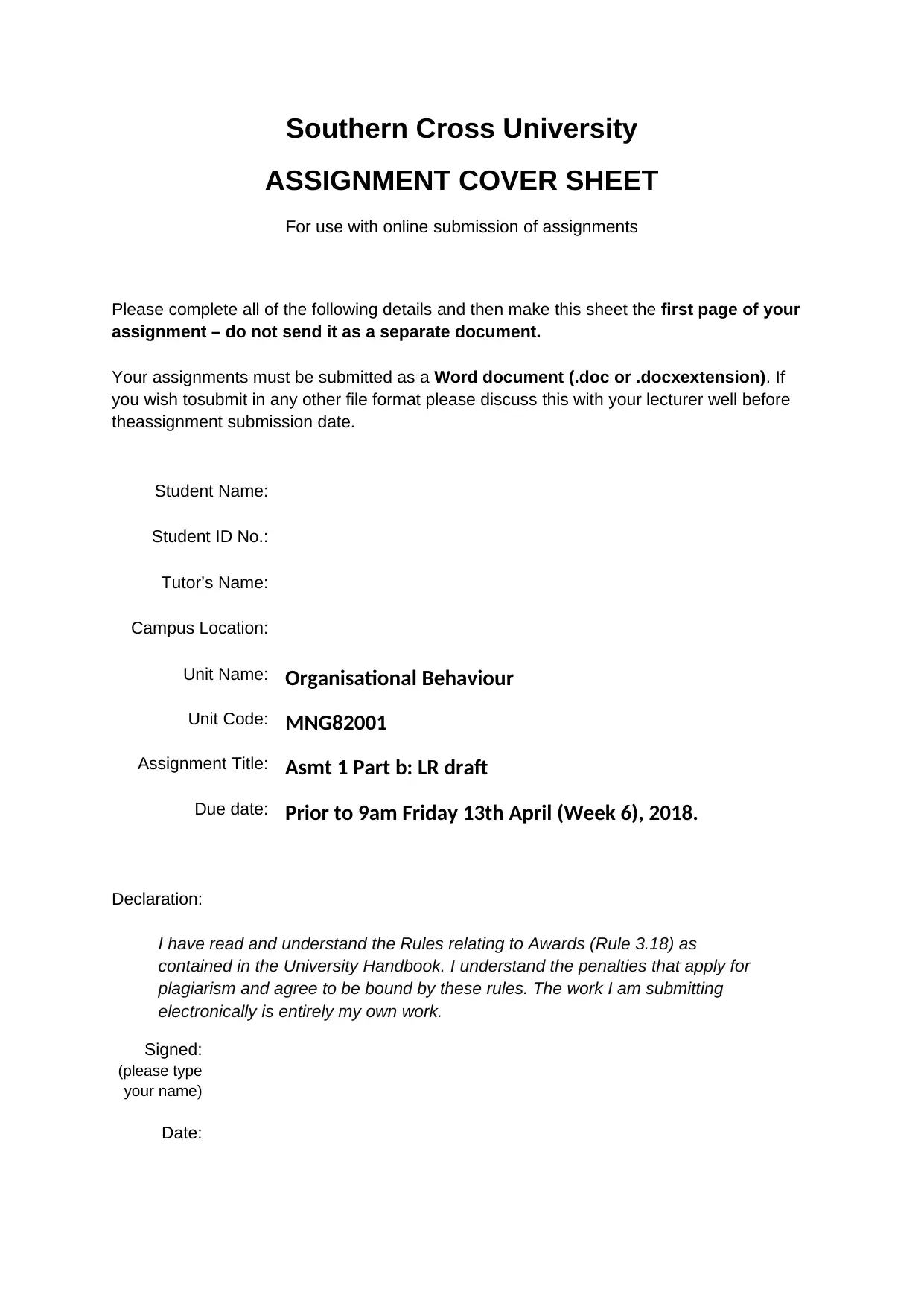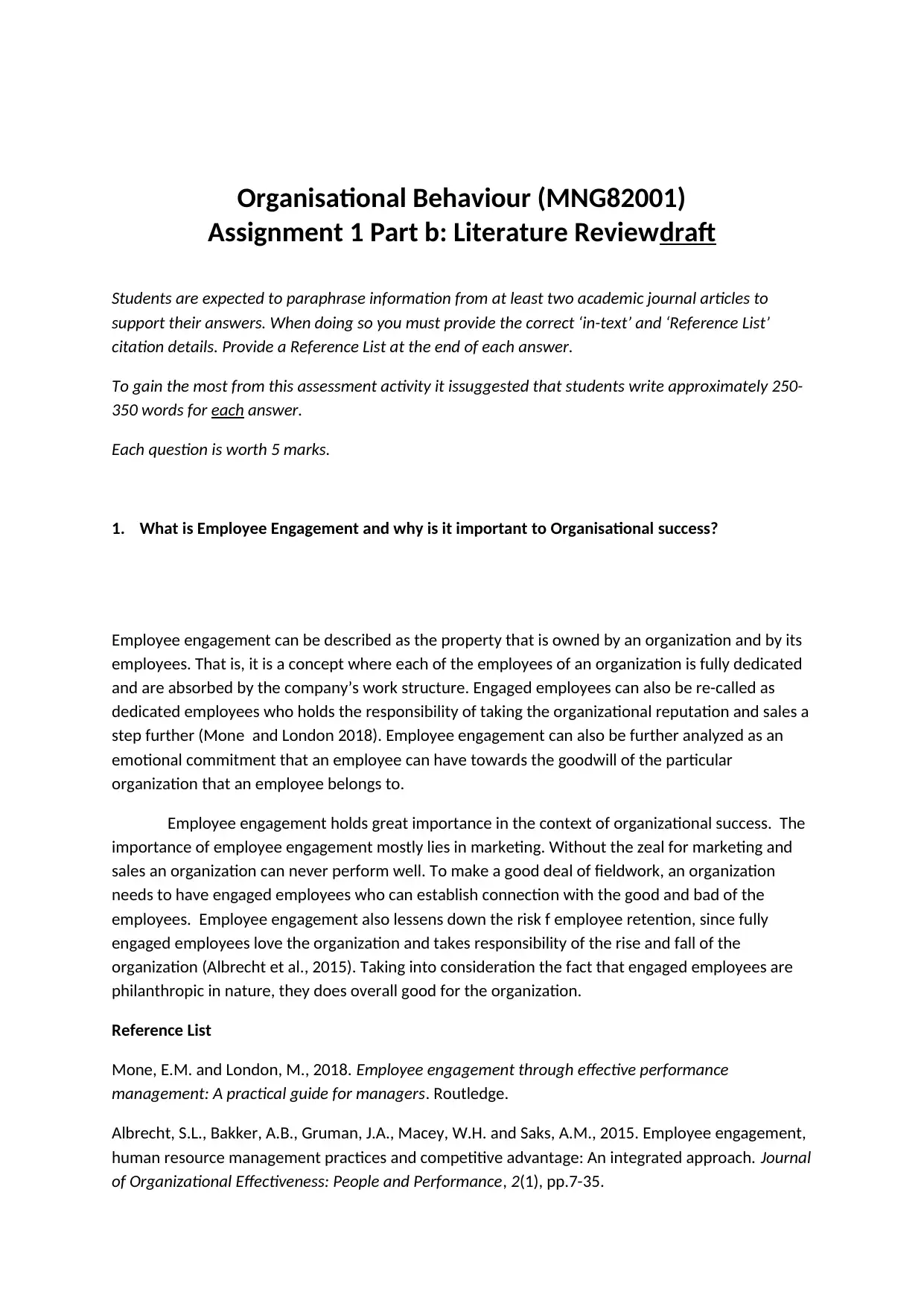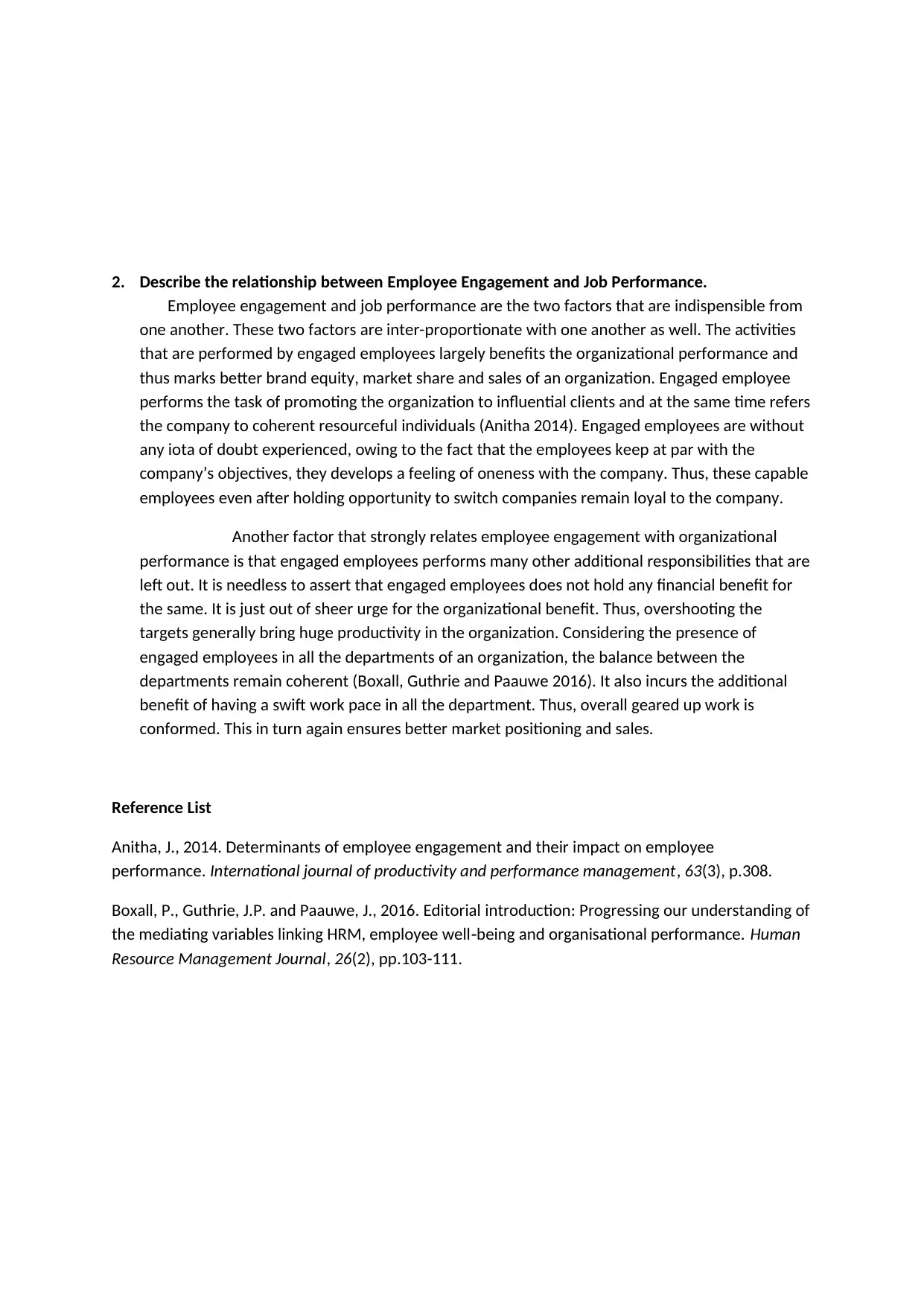MNG82001 - Employee Engagement & Job Performance: A Literature Review
VerifiedAdded on 2023/06/13
|3
|966
|493
Literature Review
AI Summary
This literature review explores the concepts of employee engagement and its impact on organizational success and job performance. It defines employee engagement as the dedication and emotional commitment employees have towards their organization, highlighting its importance in marketing, employee retention, and overall organizational goodwill. The review also establishes a strong relationship between employee engagement and job performance, noting that engaged employees contribute to better brand equity, market share, and sales. They exhibit loyalty, take on additional responsibilities, and foster a coherent work environment, ultimately leading to increased productivity and improved market positioning. The analysis is supported by citations from academic journal articles, emphasizing the practical implications of employee engagement within organizations.

Southern Cross University
ASSIGNMENT COVER SHEET
For use with online submission of assignments
Please complete all of the following details and then make this sheet the first page of your
assignment – do not send it as a separate document.
Your assignments must be submitted as a Word document (.doc or .docxextension). If
you wish tosubmit in any other file format please discuss this with your lecturer well before
theassignment submission date.
Student Name:
Student ID No.:
Tutor’s Name:
Campus Location:
Unit Name: Organisational Behaviour
Unit Code: MNG82001
Assignment Title: Asmt 1 Part b: LR draft
Due date: Prior to 9am Friday 13th April (Week 6), 2018.
Declaration:
I have read and understand the Rules relating to Awards (Rule 3.18) as
contained in the University Handbook. I understand the penalties that apply for
plagiarism and agree to be bound by these rules. The work I am submitting
electronically is entirely my own work.
Signed:
(please type
your name)
Date:
ASSIGNMENT COVER SHEET
For use with online submission of assignments
Please complete all of the following details and then make this sheet the first page of your
assignment – do not send it as a separate document.
Your assignments must be submitted as a Word document (.doc or .docxextension). If
you wish tosubmit in any other file format please discuss this with your lecturer well before
theassignment submission date.
Student Name:
Student ID No.:
Tutor’s Name:
Campus Location:
Unit Name: Organisational Behaviour
Unit Code: MNG82001
Assignment Title: Asmt 1 Part b: LR draft
Due date: Prior to 9am Friday 13th April (Week 6), 2018.
Declaration:
I have read and understand the Rules relating to Awards (Rule 3.18) as
contained in the University Handbook. I understand the penalties that apply for
plagiarism and agree to be bound by these rules. The work I am submitting
electronically is entirely my own work.
Signed:
(please type
your name)
Date:
Paraphrase This Document
Need a fresh take? Get an instant paraphrase of this document with our AI Paraphraser

Organisational Behaviour (MNG82001)
Assignment 1 Part b: Literature Reviewdraft
Students are expected to paraphrase information from at least two academic journal articles to
support their answers. When doing so you must provide the correct ‘in-text’ and ‘Reference List’
citation details. Provide a Reference List at the end of each answer.
To gain the most from this assessment activity it issuggested that students write approximately 250-
350 words for each answer.
Each question is worth 5 marks.
1. What is Employee Engagement and why is it important to Organisational success?
Employee engagement can be described as the property that is owned by an organization and by its
employees. That is, it is a concept where each of the employees of an organization is fully dedicated
and are absorbed by the company’s work structure. Engaged employees can also be re-called as
dedicated employees who holds the responsibility of taking the organizational reputation and sales a
step further (Mone and London 2018). Employee engagement can also be further analyzed as an
emotional commitment that an employee can have towards the goodwill of the particular
organization that an employee belongs to.
Employee engagement holds great importance in the context of organizational success. The
importance of employee engagement mostly lies in marketing. Without the zeal for marketing and
sales an organization can never perform well. To make a good deal of fieldwork, an organization
needs to have engaged employees who can establish connection with the good and bad of the
employees. Employee engagement also lessens down the risk f employee retention, since fully
engaged employees love the organization and takes responsibility of the rise and fall of the
organization (Albrecht et al., 2015). Taking into consideration the fact that engaged employees are
philanthropic in nature, they does overall good for the organization.
Reference List
Mone, E.M. and London, M., 2018. Employee engagement through effective performance
management: A practical guide for managers. Routledge.
Albrecht, S.L., Bakker, A.B., Gruman, J.A., Macey, W.H. and Saks, A.M., 2015. Employee engagement,
human resource management practices and competitive advantage: An integrated approach. Journal
of Organizational Effectiveness: People and Performance, 2(1), pp.7-35.
Assignment 1 Part b: Literature Reviewdraft
Students are expected to paraphrase information from at least two academic journal articles to
support their answers. When doing so you must provide the correct ‘in-text’ and ‘Reference List’
citation details. Provide a Reference List at the end of each answer.
To gain the most from this assessment activity it issuggested that students write approximately 250-
350 words for each answer.
Each question is worth 5 marks.
1. What is Employee Engagement and why is it important to Organisational success?
Employee engagement can be described as the property that is owned by an organization and by its
employees. That is, it is a concept where each of the employees of an organization is fully dedicated
and are absorbed by the company’s work structure. Engaged employees can also be re-called as
dedicated employees who holds the responsibility of taking the organizational reputation and sales a
step further (Mone and London 2018). Employee engagement can also be further analyzed as an
emotional commitment that an employee can have towards the goodwill of the particular
organization that an employee belongs to.
Employee engagement holds great importance in the context of organizational success. The
importance of employee engagement mostly lies in marketing. Without the zeal for marketing and
sales an organization can never perform well. To make a good deal of fieldwork, an organization
needs to have engaged employees who can establish connection with the good and bad of the
employees. Employee engagement also lessens down the risk f employee retention, since fully
engaged employees love the organization and takes responsibility of the rise and fall of the
organization (Albrecht et al., 2015). Taking into consideration the fact that engaged employees are
philanthropic in nature, they does overall good for the organization.
Reference List
Mone, E.M. and London, M., 2018. Employee engagement through effective performance
management: A practical guide for managers. Routledge.
Albrecht, S.L., Bakker, A.B., Gruman, J.A., Macey, W.H. and Saks, A.M., 2015. Employee engagement,
human resource management practices and competitive advantage: An integrated approach. Journal
of Organizational Effectiveness: People and Performance, 2(1), pp.7-35.

2. Describe the relationship between Employee Engagement and Job Performance.
Employee engagement and job performance are the two factors that are indispensible from
one another. These two factors are inter-proportionate with one another as well. The activities
that are performed by engaged employees largely benefits the organizational performance and
thus marks better brand equity, market share and sales of an organization. Engaged employee
performs the task of promoting the organization to influential clients and at the same time refers
the company to coherent resourceful individuals (Anitha 2014). Engaged employees are without
any iota of doubt experienced, owing to the fact that the employees keep at par with the
company’s objectives, they develops a feeling of oneness with the company. Thus, these capable
employees even after holding opportunity to switch companies remain loyal to the company.
Another factor that strongly relates employee engagement with organizational
performance is that engaged employees performs many other additional responsibilities that are
left out. It is needless to assert that engaged employees does not hold any financial benefit for
the same. It is just out of sheer urge for the organizational benefit. Thus, overshooting the
targets generally bring huge productivity in the organization. Considering the presence of
engaged employees in all the departments of an organization, the balance between the
departments remain coherent (Boxall, Guthrie and Paauwe 2016). It also incurs the additional
benefit of having a swift work pace in all the department. Thus, overall geared up work is
conformed. This in turn again ensures better market positioning and sales.
Reference List
Anitha, J., 2014. Determinants of employee engagement and their impact on employee
performance. International journal of productivity and performance management, 63(3), p.308.
Boxall, P., Guthrie, J.P. and Paauwe, J., 2016. Editorial introduction: Progressing our understanding of
the mediating variables linking HRM, employee well being and organisational performance.‐ Human
Resource Management Journal, 26(2), pp.103-111.
Employee engagement and job performance are the two factors that are indispensible from
one another. These two factors are inter-proportionate with one another as well. The activities
that are performed by engaged employees largely benefits the organizational performance and
thus marks better brand equity, market share and sales of an organization. Engaged employee
performs the task of promoting the organization to influential clients and at the same time refers
the company to coherent resourceful individuals (Anitha 2014). Engaged employees are without
any iota of doubt experienced, owing to the fact that the employees keep at par with the
company’s objectives, they develops a feeling of oneness with the company. Thus, these capable
employees even after holding opportunity to switch companies remain loyal to the company.
Another factor that strongly relates employee engagement with organizational
performance is that engaged employees performs many other additional responsibilities that are
left out. It is needless to assert that engaged employees does not hold any financial benefit for
the same. It is just out of sheer urge for the organizational benefit. Thus, overshooting the
targets generally bring huge productivity in the organization. Considering the presence of
engaged employees in all the departments of an organization, the balance between the
departments remain coherent (Boxall, Guthrie and Paauwe 2016). It also incurs the additional
benefit of having a swift work pace in all the department. Thus, overall geared up work is
conformed. This in turn again ensures better market positioning and sales.
Reference List
Anitha, J., 2014. Determinants of employee engagement and their impact on employee
performance. International journal of productivity and performance management, 63(3), p.308.
Boxall, P., Guthrie, J.P. and Paauwe, J., 2016. Editorial introduction: Progressing our understanding of
the mediating variables linking HRM, employee well being and organisational performance.‐ Human
Resource Management Journal, 26(2), pp.103-111.
⊘ This is a preview!⊘
Do you want full access?
Subscribe today to unlock all pages.

Trusted by 1+ million students worldwide
1 out of 3
Related Documents
Your All-in-One AI-Powered Toolkit for Academic Success.
+13062052269
info@desklib.com
Available 24*7 on WhatsApp / Email
![[object Object]](/_next/static/media/star-bottom.7253800d.svg)
Unlock your academic potential
Copyright © 2020–2025 A2Z Services. All Rights Reserved. Developed and managed by ZUCOL.




